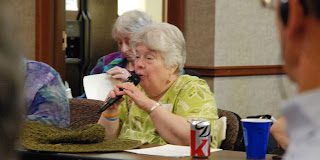Online and Virtual Gatherings: Inclusion for Deaf and
Hard-of-Hearing Members
By Rev. Leo Yates, Jr.
With most churches across mainline denominations closing
in-person gatherings and worship services, pastoral leaders and staff are being
more creative as they toss aside the “Things They Didn’t Teach You in Seminary”
book. Many churches are offering live streamed worship services, prerecorded
videos, and conference calls to continue their community in a virtual way.
Just about all churches have persons with hearing loss, a
condition that is particularly true of seniors. In-person gatherings typically
use public address systems as assistive technology, but online or live streamed
worship services present challenges to ensure that persons with hearing loss can
hear through computers, iPads, and laptops. We will look at several options to
ensure that everyone can participate.
Sign Language Interpreters
Several United Methodist churches use sign language
interpreters in their streamed services. Captioning is also a possibility,
although fewer churches use this capability.
Some use an overlay or insert – a picture of the interpreter
inside the primary video (below) – while others place the interpreter next to
the preacher or other speaker (above). When using the insert method, note that the
image can easily become too small for comfortable viewing, so for best
accessibility, choose a size carefully.
Captioning
Captioning is strongly desired by most Deaf and hard-of-hearing persons who rely on this form of accessibility. No captioning platform
displays perfect captions; however, there are some that are better than others.
If using an app such as Zoom, the host of the call can
download the video to make it available later. Captions can then be added,
using plans such as
Caption Sync or
Otter.ai. Zoom also offers
the captioning feature during video calls (
click
here for instructions).
Google Hangouts is a free option
for small virtual gatherings, such as Bible studies, that includes a captions
feature. Using Google Hangouts as an example, this approach better enables
persons with some hearing loss, like some seniors, to still participate in
gatherings.
 Caption feature in Google
Hangouts with a presentation
Caption feature in Google
Hangouts with a presentation
While Facetime is an option for Facebook users to view live stream
worship services, not everyone is a Facebook user. Plus, at the time of this
writing, it does not offer a captioning feature.
YouTube offers automatic captioning, but the results are often incorrect (if not sometimes humorously so). However, the caption track can be exported and edited. For directions on how to do this, or more information about captioning in general, visit the Deaf and
Hard-of-Hearing Committee’s Assistive Technology page
here.
Conference Calls
Conference calls for prayer meetings and the like are still a
popular way to gather. A Deaf
or hard-of-hearing caller whose primary language is ASL can connect
through the video relay service (VRS), in which the caller participates
(through signing and speech) through a (free) sign language interpreter who
connects the caller to the conference call.
FreeConferenceCall.com is
still highly popular, though other platforms, like Zoom, generally offer a
call-in option for audio users. For hard-of-hearing and late-deafened persons who
rely on captioning, a
Captel
phone is a device that allows the user to speak through a handset, while
reading the captions on their phone.
 Captel phone displaying
captions.
Captel phone displaying
captions.
Visuals and Materials
Visual presentations are typically helpful for participants
to follow along and this is just as important for Deaf and hard of hearing
participants. Hymns, lyrics, Scriptures, and the like are the needed visual
presentations to include. Making visual presentations and materials available
for download by participants is especially helpful. One option is Google Suite
(e.g. docs and presentations), which offers published links to share. Be
mindful Deafblind persons with low vision or others with vision impairment may
desire a large print option for download. With proper alt-texts, these methods
offer wide-ranging accessibility.
Face masks
Conclusion
In a time where churches need to be more creative in
engaging our faith communities through virtual gatherings and events, inclusion
of Deaf and hard of hearing persons still needs to be a consideration. Be sure
to promote your accessible virtual events or at least add it in the event’s
description.
The
Deaf
and Hard-of-Hearing Ministries Committee through Global Ministries
has a link of accessible live streamed worship services. The list of worship
services can be
accessed here. This page
also lists addiction recovery resources available in ASL, such as AA online
meetings with sign language interpreters. The committee also offers a section
on accessible technology
here.
Addendum
There is much advice flying around about how to handle remote meetings and other business since this blog was published. We are adding a few which address hearing needs and practical experience.


